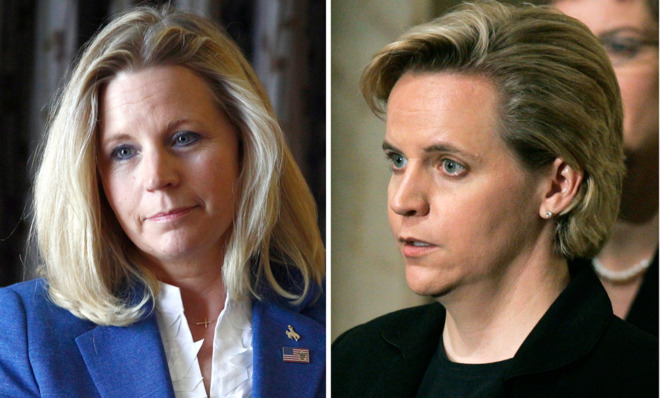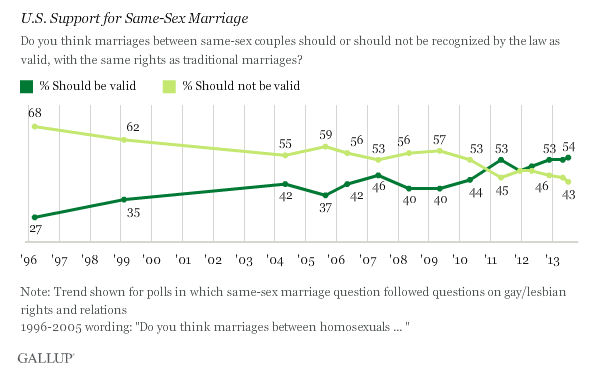Why the Cheneys' gay marriage feud could burn the GOP
So much for that Republican rebrand


A free daily email with the biggest news stories of the day – and the best features from TheWeek.com
You are now subscribed
Your newsletter sign-up was successful
You can add "messy intra-family fight over the legitimacy of a sister's same-sex marriage" to the long list of problems facing Liz Cheney's quixotic Senate bid.
More than that though, you can add it to the long list of woes facing the Republican Party's halting rebrand. With a civil war for control of the party already underway, the spat underscores the emerging divide within the GOP over how to handle a politically explosive issue on which the party is increasingly on the wrong side of shifting public opinion.
For all the national coverage of the imbroglio, it's a comparative nothingburger back in Wyoming, where Cheney is trying to unseat three-term Sen. Mike Enzi in a primary fight. And even if the scuttlebutt were politically explosive, it wouldn't necessarily matter much in the race given Cheney's highly improbable odds of winning. Enzi has a comfortable 30-point lead, and a majority of Wyoming Republicans, in one poll, said Cheney was not even a true Wyomingite.
The Week
Escape your echo chamber. Get the facts behind the news, plus analysis from multiple perspectives.

Sign up for The Week's Free Newsletters
From our morning news briefing to a weekly Good News Newsletter, get the best of The Week delivered directly to your inbox.
From our morning news briefing to a weekly Good News Newsletter, get the best of The Week delivered directly to your inbox.
Nationally, though, the fight has laid bare the GOP's gay marriage divide, while reinforcing a stereotype of the party as uncaring and out of touch.
Gay marriage is no longer the wedge issue it once was. Fifteen states and the District of Columbia have legalized gay marriage; the Supreme Court has ruled that the federal government cannot deny benefits to same-sex couples; and a strong majority of Americans now support same-sex marriage.
The trend line is striking, showing just how quickly Americans have come around:

Even three in ten conservatives now back same-sex marriage — an admittedly low number, but up markedly from a decade ago when only 18 percent did.
A free daily email with the biggest news stories of the day – and the best features from TheWeek.com
It's in this rapidly shifting climate that President Obama, in the span of only a few years, can "evolve" from supporting civil unions to fully backing same-sex marriages. And it's in this environment that even Karl Rove said he wouldn't be surprised if the 2016 GOP presidential nominee, too, supported same-sex marriage.
The Republican Party acknowledged in its 2012 post-mortem that it had to soften its image and modernize its views to remain viable with a changing electorate. Having a Senate candidate essentially disown her sister and sister-in-law, in public, for being gay is not the best way to convince voters you're truly moving in that direction.
Nor does it reflect well on your party as a whole when that candidate's father — a deeply unpopular former vice president, no less — has to defend her, essentially tossing another daughter under the bus in the process. (And really, is it ever a good thing, branding-wise, for the GOP to have Dick Cheney going on record about the party platform?)
Rather, voters could easily read Liz Cheney's position as heartless and, quite plainly, politically opportunistic. Scoring political points by knocking your own family members — while at the same time reminding voters that the GOP's official line on gay marriage is increasingly out of step with the majority of America — is not the sort of thing a party desperately in search of a broader base can afford.
Jon Terbush is an associate editor at TheWeek.com covering politics, sports, and other things he finds interesting. He has previously written for Talking Points Memo, Raw Story, and Business Insider.
-
 How the FCC’s ‘equal time’ rule works
How the FCC’s ‘equal time’ rule worksIn the Spotlight The law is at the heart of the Colbert-CBS conflict
-
 What is the endgame in the DHS shutdown?
What is the endgame in the DHS shutdown?Today’s Big Question Democrats want to rein in ICE’s immigration crackdown
-
 ‘Poor time management isn’t just an inconvenience’
‘Poor time management isn’t just an inconvenience’Instant Opinion Opinion, comment and editorials of the day
-
 The billionaires’ wealth tax: a catastrophe for California?
The billionaires’ wealth tax: a catastrophe for California?Talking Point Peter Thiel and Larry Page preparing to change state residency
-
 Bari Weiss’ ‘60 Minutes’ scandal is about more than one report
Bari Weiss’ ‘60 Minutes’ scandal is about more than one reportIN THE SPOTLIGHT By blocking an approved segment on a controversial prison holding US deportees in El Salvador, the editor-in-chief of CBS News has become the main story
-
 Has Zohran Mamdani shown the Democrats how to win again?
Has Zohran Mamdani shown the Democrats how to win again?Today’s Big Question New York City mayoral election touted as victory for left-wing populists but moderate centrist wins elsewhere present more complex path for Democratic Party
-
 Millions turn out for anti-Trump ‘No Kings’ rallies
Millions turn out for anti-Trump ‘No Kings’ ralliesSpeed Read An estimated 7 million people participated, 2 million more than at the first ‘No Kings’ protest in June
-
 Ghislaine Maxwell: angling for a Trump pardon
Ghislaine Maxwell: angling for a Trump pardonTalking Point Convicted sex trafficker's testimony could shed new light on president's links to Jeffrey Epstein
-
 The last words and final moments of 40 presidents
The last words and final moments of 40 presidentsThe Explainer Some are eloquent quotes worthy of the holders of the highest office in the nation, and others... aren't
-
 The JFK files: the truth at last?
The JFK files: the truth at last?In The Spotlight More than 64,000 previously classified documents relating the 1963 assassination of John F. Kennedy have been released by the Trump administration
-
 'Seriously, not literally': how should the world take Donald Trump?
'Seriously, not literally': how should the world take Donald Trump?Today's big question White House rhetoric and reality look likely to become increasingly blurred
